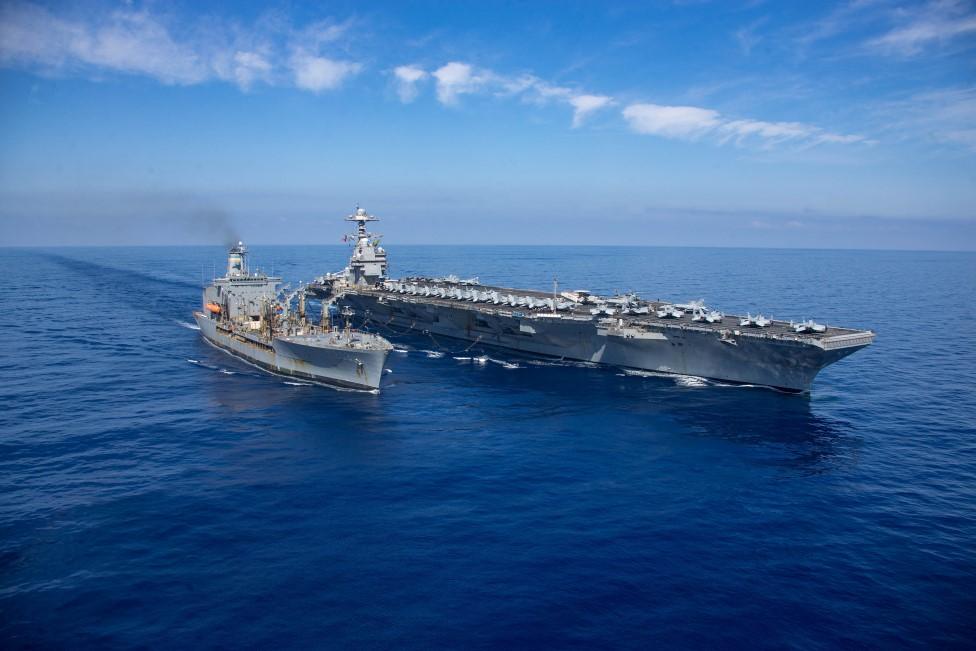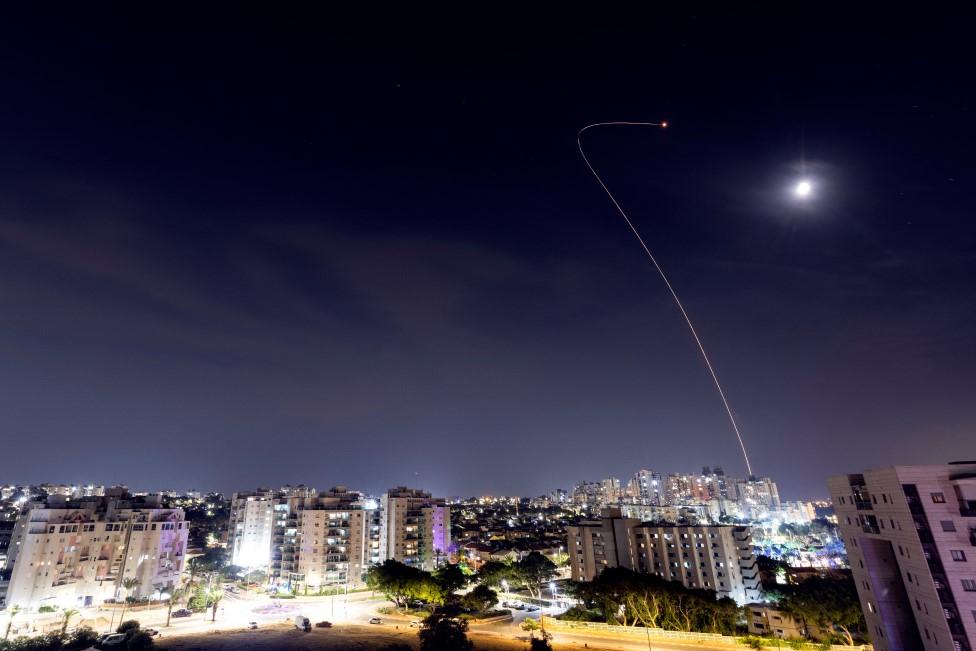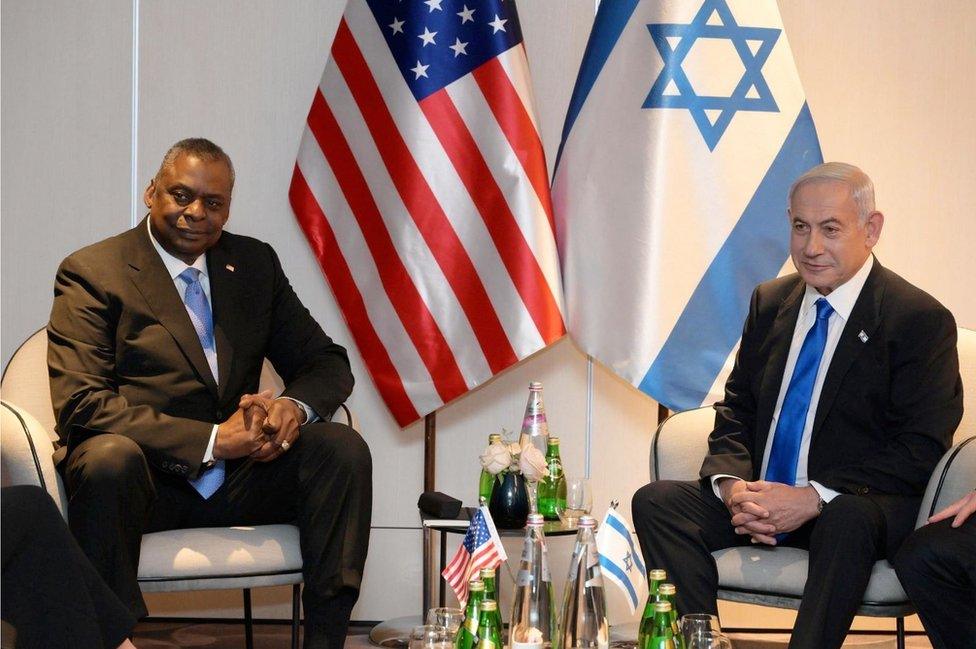How far would the US go to defend Israel?
- Published

The USS Gerald R Ford is part of the US show of force in the Eastern Mediterranean
The US has pledged its unwavering support to Israel and backed that up with military aid. But with the scars of past entanglements in the region still being felt, where is the limit to US involvement?
In his first reaction to the attack on Israel by Hamas, President Biden made clear whose side he's on: "The United States has Israel's back," he said.
"To anyone thinking of taking advantage of the situation, I have one word: Don't," he added.
This warning was clearly aimed at Iran and its allies.
US troops in Iraq and Syria have been attacked several times in recent days, the Pentagon says, and a US destroyer in the Red Sea intercepted missiles fired from Yemen which were "potentially" aimed towards Israel.
The US already has a carrier strike group in the Eastern Mediterranean, soon to be joined by another in the region. Each aircraft carrier has more than 70 aircraft on board - considerable firepower. Mr Biden has also placed thousands of US troops on standby to move to the region if required.
The US is Israel's largest military backer, providing about $3.8bn of defence aid a year.
The Israeli jets bombing Gaza are American-made, as are most of the precision-guided munitions now being used. Some of the interceptor missiles for Israel's Iron Dome air defence system are also produced in the US.
The US was sending re-supplies of those weapons even before Israel requested them. And on Friday President Biden asked Congress to approve $14bn funding for its Middle Eastern ally's war chest as part of a $105bn (£87bn) military aid package.
The following day, the Pentagon announced it would send two of its most powerful missile defence systems to the Middle East - a Terminal High Altitude Area Defense (THAAD) battery and additional Patriot batteries.
But would a US president really be willing to become embroiled in another war, especially in an election year? Recent US military adventures in the region have proved costly - politically, economically and in terms of American lives.

More on Israel-Gaza war
Follow live: Latest updates
Explained: What is happening in Israel and Gaza, and why now?
History behind the story: The Israel-Palestinian conflict
Gaza: Dead and wounded strain Gaza hospitals as air strikes intensify

Michael Oren, a former US Israeli ambassador to the US, believes President Biden has already taken a first step by moving US aircraft carriers in the region. "You don't take that kind of pistol out unless you're willing to use it," he says.
But Seth G Jones, director of International Security at the Centre for Strategic and International Studies in Washington, says the US would be very reluctant to get directly engaged militarily in a war in Gaza.
The presence of the carrier strike groups, he says, could be useful "without firing a shot", not least because of their ability to gather intelligence and to provide air defences. Any engagement would be "a last resort", he says.
It is primarily the threat from Israel's north, and specifically from the militant group Hezbollah, which now worries both Israel and the US.
The Iranian-backed group is a much greater threat than Hamas in Gaza. It has an arsenal of around 150,000 rockets which are more powerful and accurate than the ones used by Hamas. And it has already exchanged fire with Israel, its sworn enemy.
Mr Oren fears Hezbollah could intervene when Israel is "already deep inside Gaza and already committed and tired".
If that happens, then Mr Oren believes there is a possibility the US would commit its sizeable airpower to strike targets inside Lebanon, though he does not see a situation in which America would commit boots on the ground.

Israel's Iron Dome anti-missile system intercepts a rocket from Gaza
Secretary of State Antony Blinken and Defence Secretary Lloyd Austin have both asserted that the US would respond if the situation escalates and any US personnel or military are targeted.
The US has the right to defend itself, said Mr Austin on Sunday, and it will not hesitate to "take the appropriate action".
Mr Jones acknowledges the risk of the conflict widening, but he believes that US deterrence "does raise the costs of risks for Iran and its proxies".
He says if Hezbollah in Lebanon were to engage in a major offensive operation from the north of Israel, "they would likely face a pretty serious response". He notes US forces in the region have come under limited attacks from Iranian linked groups before.
Nor is Israel asking for direct military support in its war with Hamas. Danny Orbach, professor of military history at the Hebrew University of Jerusalem, points out that Israel's military doctrine states it should be able to protect itself on its own.

Lloyd Austin with Israeli Prime Minister Benjamin Netanyahu
President Biden's visit to Israel this week showed that US support is conditional. He wants Israel to allow humanitarian aid into Gaza, and he does not want to see Israel occupy the Gaza strip indefinitely. He told CBS's 60 Minutes that doing so would be a "big mistake".
US support may also be time limited. Yaacov Katz, a military analyst and a columnist with the Jerusalem Post, believes that America's support for Israel will come under pressure as soon as its military operation begins in Gaza and the civilian casualties mount.
He believes support could soften within weeks. "I don't see Israel getting more leeway from America or the world for a ground offensive that lasts much longer," he says.
The US clearly hopes that its military support for Israel and its own bolstered military presence in the region will be enough to prevent the conflict widening.
There are few examples of the US directly intervening on behalf of Israel. The US sending Patriot batteries to defend Israel from Iraqi Scud missiles attacks, ahead of its own invasion in the 1991 Gulf war, is a rare exception.
In fact, the US has more often used its military leverage over Israel as a restraining hand.